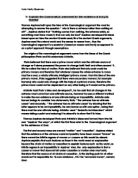Paley asks us first to imagine what thoughts we would have if we came across a stone on a desert. He said that we would not think it strange that the rock was there, it wouldn’t lead us to believe that a designer had made it and placed it there. However he then asks us to imagine we have come across a pocket watch in the same surroundings. If we found a watch, we would observe that it has form and order because it works in a regular ticking action. We would also conclude that it was created with a purpose, to tell the time. From this we would know that there was and has to have been a designer. Paley compared this to a human eye. It is such a complex design. If the parts of an eye, like the cogs in a watch were put together differently then it wouldn’t work and we would not be able to see properly. This comparison leads us to understand that our human bodies are so complex that there must have been a design. If there is a design then there must also be a designer, like the watchmaker. Paley says that this designer must be God. Similarly Paley looked at the universe. He didn’t yet know of the scientific explanations for the mechanics of the universe. He suggested that the universe has certain design of laws and cycles that if follows so god must be the designer of the universe.
To conclude Paley’s version of the teleological argument argues that structure or order or purpose in the universe is evidence for the idea of a creator or a designer. From experience and observation we can conclude that wherever an object (or system) has parts ordered, arranged, and inter- related in a complex, delicately balanced way, so a certain purpose can be achieved, then the object (or system) is the product of an intelligent designer. Paley said that this designer has to be God
“The universe has no purpose” (10 Marks)
I agree with this statement. Arguments I would use to support this are Darwin’s evolution theory and animals that go extinct, the rising population and the fact that one day the world will die and the universe will fall apart. However an argument against is the teleological argument, put forward by Aquinas, Paley and Tennant.
Firstly, in the 19th century Darwin published his theory of evolution. He explained that all animals have adapted through natural selection. You could argue from this that evolution means that we are in progress of reaching an end, and this is the purpose. However I would say that actually if animals have gone extinct through natural selection, then this means that they had no purpose so evolution gives us evidence for the statement, “the universe has no purpose”.
The rising population will one day mean that there is not going to be enough resources for every living person. Global warming will suffocate the world or the sun will engulf the Earth. First of all, if we all die out then was there any real purpose of us being here in the first place. It does not make sense if the world was created with the purpose of dying, and so this means there must be no purpose at all.
An argument against what I have said above would be the teleological argument. Philosophers such as Aquinas, Paley and Tennant all believed that the world was evidence of design, and design means there must be a purpose. Aquinas’ fifth way stated that whatever lacked knowledge cannot move towards an end/fulfil its purpose unless of course something else is directing it that has intelligence i.e. God. Paley used the watch analogy, he said like how God created the world, a watchmaker creates watches for a purpose. Finally Tennant said that humans have aesthetic sense which couldn’t have come from evolution and this means that God gave us aesthetic sense for a purpose.
In conclusion I would argue that there is more evidence to support the statement that the universe has no purpose than against it. We know through Darwin and science that we have evolved through natural selection and that over millions of years many species have gone extinct. Sciences also predict that the human race will die out and the earth will be engulfed by the sun and destroyed. The arguments against such as the teleological argument are only theories with little evidence and so do not outweigh this.








